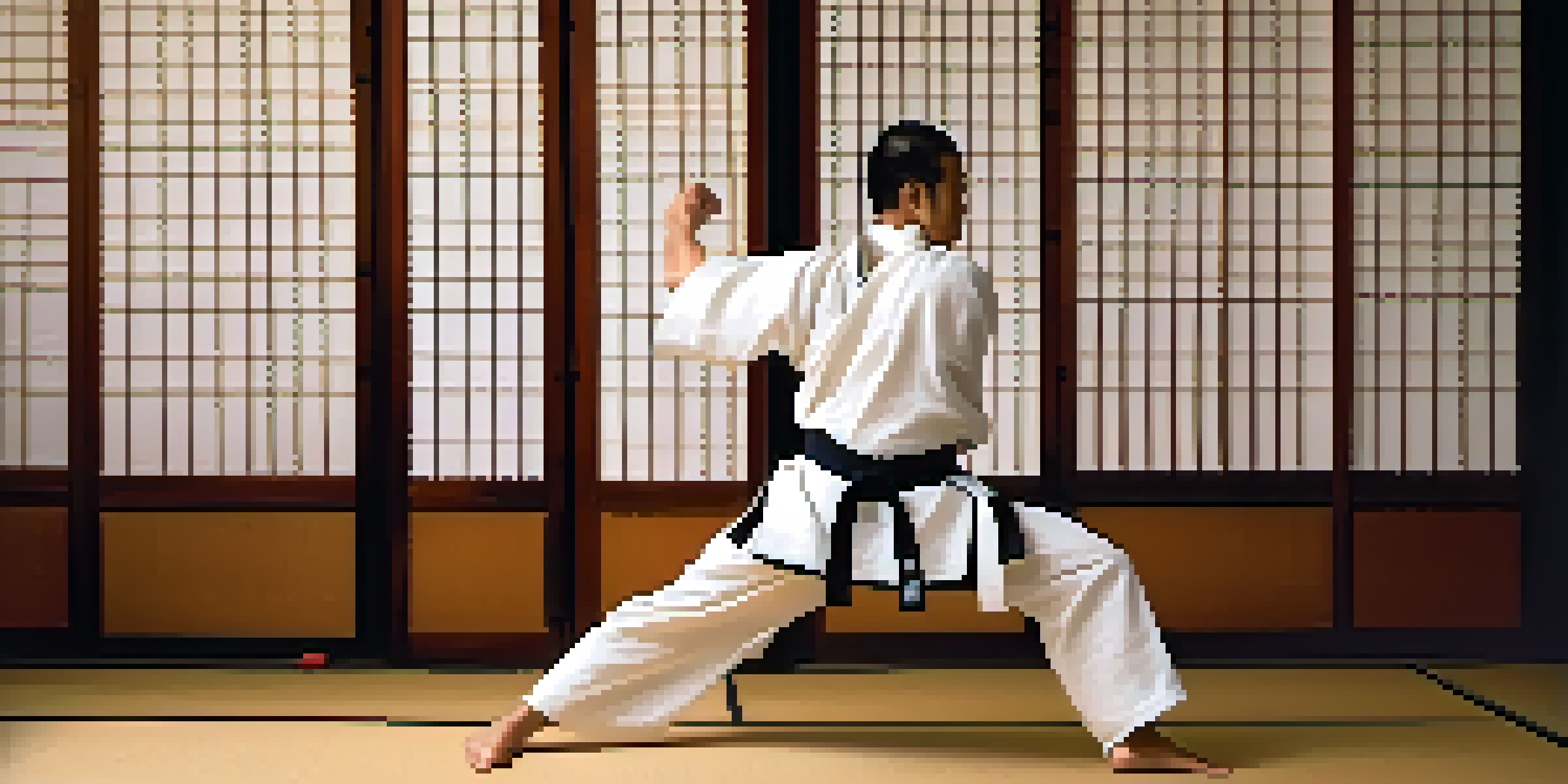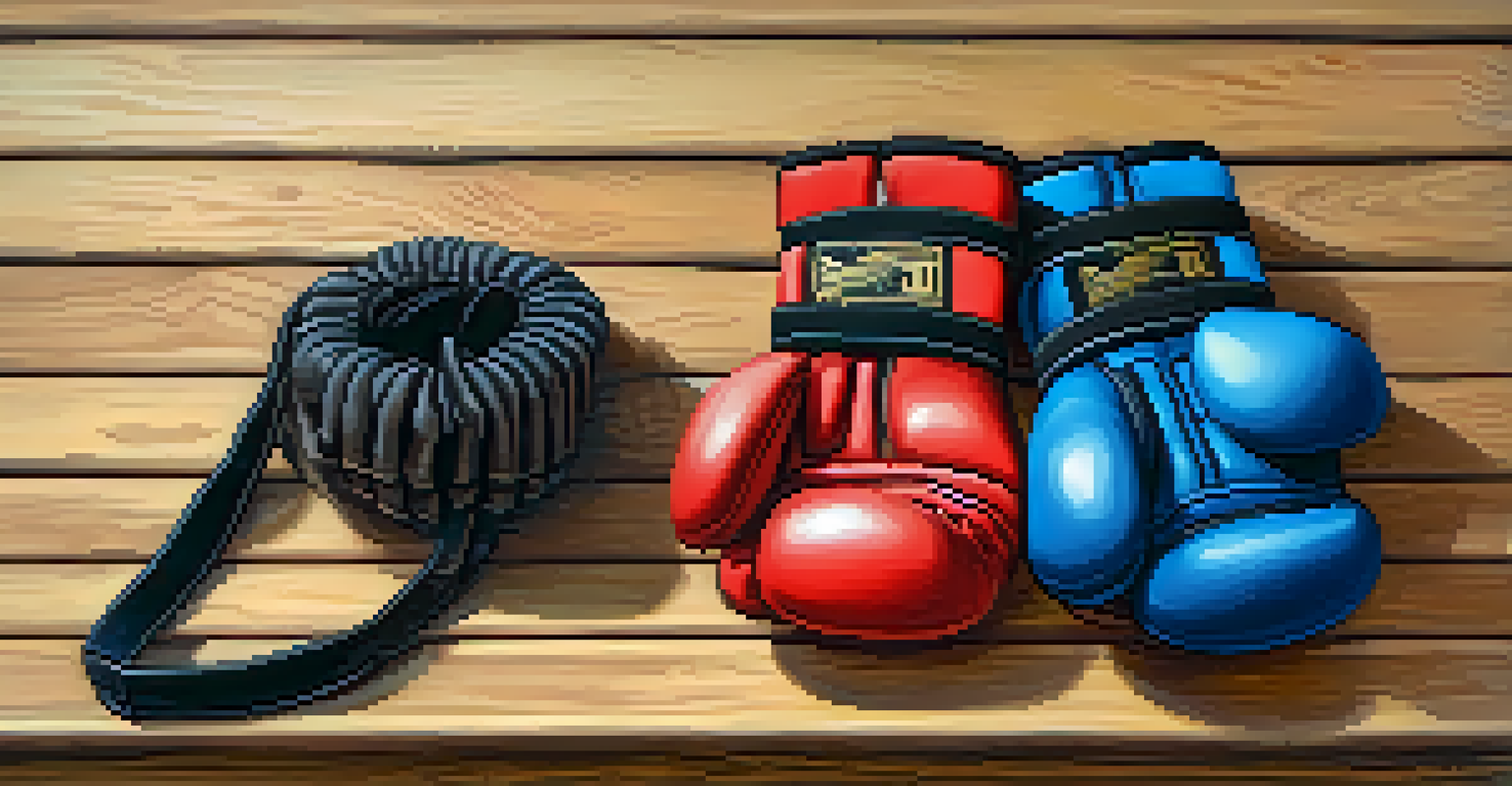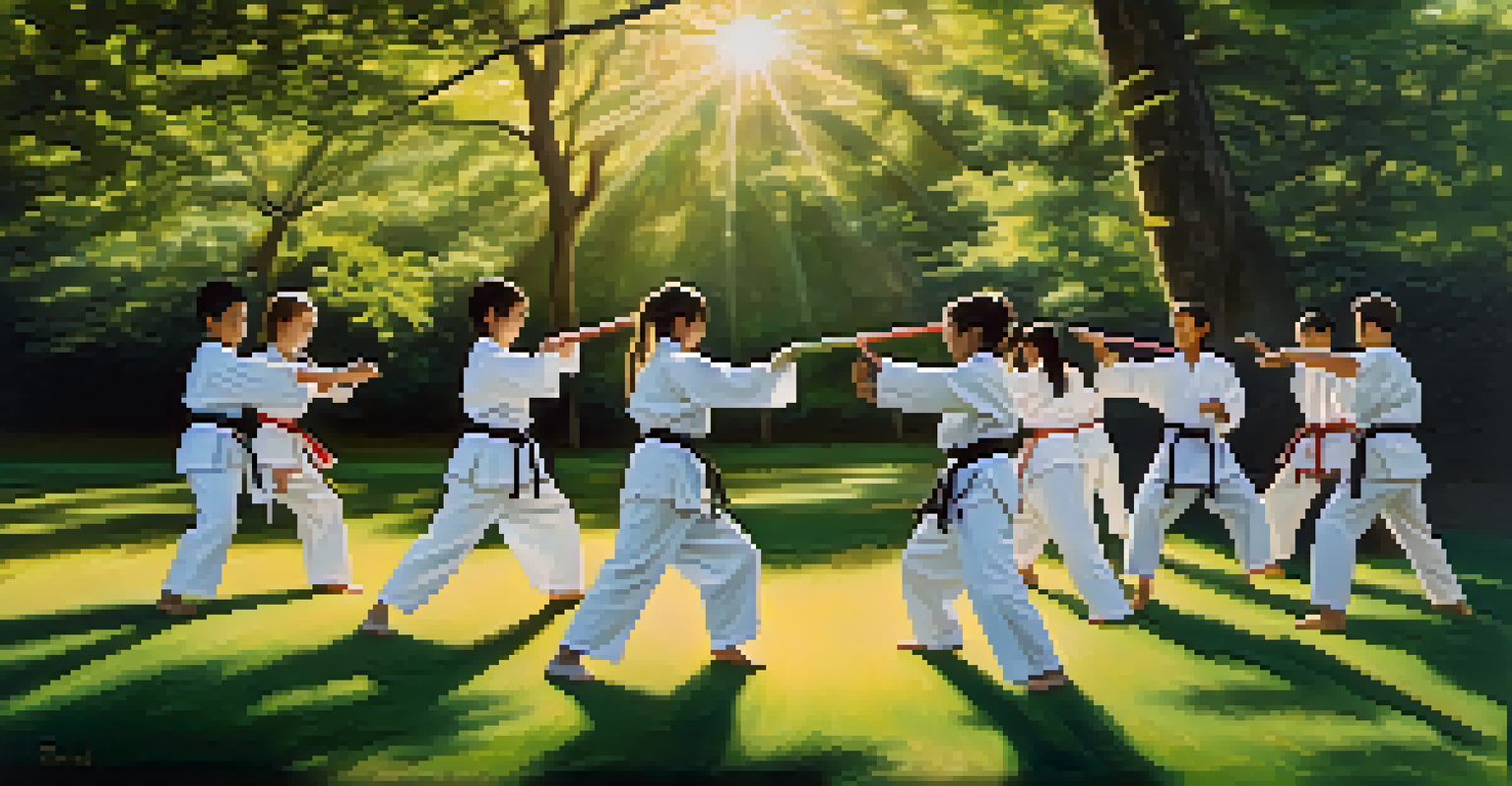Finding Balance: Adaptability Through Martial Arts Training

Understanding Adaptability in Martial Arts Training
Adaptability is a crucial skill in martial arts, as it allows practitioners to respond effectively to various situations. In a class, you might face different opponents with unique styles, requiring you to adjust your techniques on the fly. This flexibility not only enhances your fighting skills but also teaches life lessons about handling change and uncertainty. Just as in life, martial arts training emphasizes being open to new experiences and challenges.
Adaptability is about the powerful difference between adapting to cope and adapting to win.
For example, consider a scenario where you are sparring with a partner who employs an unexpected strategy. Instead of sticking rigidly to your usual approach, you learn to read their movements and adapt accordingly. This process of adjustment mirrors everyday situations, where being adaptable can lead to better outcomes, whether in your personal life or professional endeavors. The ability to switch tactics in martial arts can foster confidence and resilience in real-world scenarios.
Ultimately, the practice of adaptability in martial arts cultivates a mindset that embraces change. Practitioners learn that success often comes from being willing to pivot and try new things. This lesson transcends the dojo, encouraging individuals to approach life's challenges with a flexible and open-minded attitude.
Building Mental Resilience Through Training
Training in martial arts is not just about physical prowess; it also builds mental resilience. Each class challenges you to step out of your comfort zone, whether it's mastering a difficult move or facing a more experienced opponent. This consistent exposure to challenges strengthens your mental fortitude, helping you to remain calm and focused under pressure. Over time, you'll find that this resilience spills over into other areas of your life.

Imagine preparing for a competition where nerves might overwhelm you. The mental strategies you develop in training—like visualization and positive self-talk—can help you perform better when it counts. As you face fears and overcome obstacles in the dojo, you become better equipped to handle stress and adversity outside of it. This newfound resilience can significantly impact your ability to adapt in various life situations.
Adaptability Enhances Life Skills
Practicing adaptability in martial arts helps individuals respond to life’s challenges with flexibility and resilience.
Moreover, mental resilience is about maintaining a positive attitude despite setbacks. In martial arts, you will inevitably encounter failures—be it a failed throw or an unexpected loss in sparring. However, learning to view these moments as opportunities for growth rather than defeat is what truly builds resilience, enabling you to bounce back stronger than before.
The Role of Discipline in Finding Balance
Discipline is a fundamental aspect of martial arts training that contributes to achieving balance in life. Regular practice requires commitment and dedication, helping you develop a structured routine. This sense of discipline not only enhances your skill set but also creates a sense of stability in an otherwise chaotic world. By adhering to a training schedule, you learn to prioritize your goals and allocate time effectively.
The greatest weapon against stress is our ability to choose one thought over another.
Consider how the discipline gained from martial arts translates into everyday responsibilities. Whether it's managing work tasks or personal projects, the routine you cultivate in training can help you stay focused and organized. The skills you develop on the mat—like time management and perseverance—are invaluable in maintaining balance amidst life's demands. This structured approach fosters a sense of control, making it easier to juggle various aspects of life.
Furthermore, discipline in martial arts teaches you the importance of setting and achieving goals. Each belt you earn represents a milestone that requires hard work and perseverance. This process instills a sense of accomplishment and motivates you to pursue other challenges in life with the same dedication.
Physical Conditioning Enhances Overall Well-Being
Martial arts training is a fantastic way to improve physical conditioning, which in turn contributes to overall well-being. The diverse range of movements involved in martial arts helps develop strength, flexibility, and endurance. As you progress, you'll notice how this physical improvement not only benefits your training but also enhances your daily activities. Feeling stronger and more agile can significantly boost your confidence and self-esteem.
Imagine being able to tackle your daily workouts with ease or engage in recreational activities without fatigue. The physical conditioning gained from martial arts provides a solid foundation for a healthy lifestyle. Regular exercise is known to reduce stress and improve mood, making martial arts a powerful tool for mental health as well. This holistic approach to fitness fosters a sense of balance in both body and mind.
Discipline Creates Life Balance
The discipline gained from martial arts training fosters a structured routine that aids in managing everyday responsibilities.
Moreover, martial arts emphasizes the importance of breath control and mindfulness. Techniques such as meditation and focused breathing are often incorporated into training sessions, helping you develop a deeper connection with your body. This awareness not only enhances your performance but also cultivates a peaceful mindset, allowing you to navigate life’s challenges with greater ease.
Community Support Fosters Personal Growth
One of the most enriching aspects of martial arts training is the sense of community it fosters. Training alongside others creates a supportive environment where collaboration and encouragement thrive. This sense of belonging can be invaluable as you push yourself to grow and adapt. It’s a reminder that you are not alone on this journey, making it easier to face challenges together.
For instance, think about how sharing experiences with fellow practitioners can motivate you to improve. Whether it’s practicing techniques together or sharing personal stories, this camaraderie can provide inspiration and accountability. The friendships formed through martial arts often extend beyond the dojo, creating a network of support that can help you navigate life’s ups and downs.
Furthermore, the diverse backgrounds of your training partners expose you to different perspectives. Engaging with people from various walks of life can broaden your understanding and enhance your adaptability. This exchange of ideas and experiences enriches your martial arts journey while also contributing to your personal growth.
Setting Realistic Goals for Continuous Improvement
Goal-setting is a crucial component of martial arts training that teaches you how to continuously improve. By establishing clear and realistic goals, you create a roadmap for your development. These goals can range from mastering a specific technique to achieving a new belt rank. The process of working toward these objectives fosters a sense of purpose and motivation, helping you stay focused on your training.
Consider how breaking larger goals into smaller, achievable steps can enhance your progress. Each small victory builds confidence and reinforces your commitment to growth. For example, if your goal is to earn a black belt, you can focus on mastering each rank along the way. This incremental approach not only makes the journey manageable but also highlights the value of patience and persistence.
Community Supports Personal Growth
Training in a supportive community cultivates motivation and accountability, enhancing personal growth and adaptability.
Moreover, setting goals in martial arts encourages a growth mindset. Instead of viewing challenges as obstacles, you learn to see them as opportunities for learning. This perspective can significantly impact your approach to challenges in other areas of life, encouraging you to embrace new experiences and adapt to changing circumstances with confidence.
Embracing the Journey: Martial Arts as a Life Philosophy
Martial arts is more than just a form of physical activity; it can serve as a guiding philosophy for life. The principles of respect, discipline, and perseverance that you learn on the mat can be applied in everyday situations. This holistic approach encourages you to embrace the journey of self-improvement, making it easier to adapt to the various changes life throws your way. Each training session becomes a lesson in balance and growth.
For instance, consider how the values you cultivate in martial arts—such as humility and patience—can influence your interactions with others. By embodying these principles, you create a more harmonious environment both in and out of the dojo. This mindset encourages a deeper understanding of yourself and others, fostering empathy and connection.

Ultimately, embracing martial arts as a life philosophy allows you to approach challenges with a positive and adaptable mindset. Just as you learn to flow with your opponent in sparring, you can learn to navigate life's complexities with grace. This journey of self-discovery and growth can lead to a more balanced and fulfilling life, both on and off the mat.